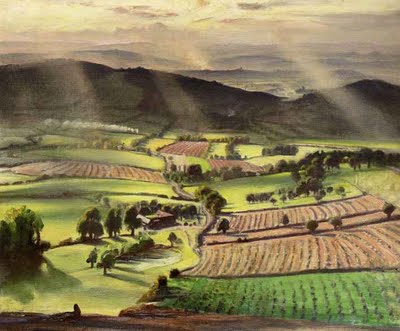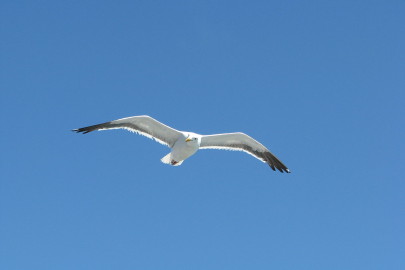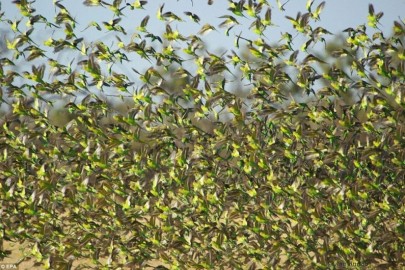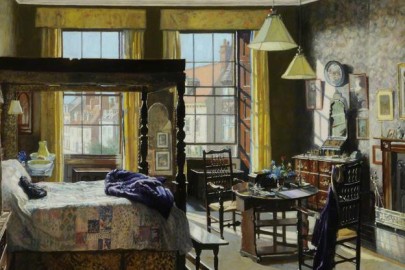In today’s Dabbler Verse post, Stephen introduces P. J. Kavanagh’s poetic tribute to Edward Thomas…
This coming Wednesday is the 97th anniversary of Edward Thomas’s death at the Battle of Arras. In 1917, April 9th fell on Easter Monday.
Edward Thomas in Heaven
Edward, with thinning hair and hooded eyes
Walking in England, haversack sagging, emptied of lies,
Snuffing and rubbing Old Man in the palm of your hand
You smelled an avenue, dark, nameless, without end.In France, supposing the shell that missed
You and sucked your breath out as it passed
Released your soul according to the doctrine
You disbelieved and were brought up in,
From slaughtered fields to Christian purgatory?
(Assuming your working life, the sad history
You sweated through, and marvellous middens of rural stuff
You piled together were not purgatory enough?)
Are you now a changed person, gay and certain?
Your eyes unhooded, bland windows without a curtain?
Then it would not be heaven. It would be mere loss
To be welcomed in by an assured Edward Thomas.
There must be doubt in heaven, to accommodate him
And others we listen for daily, who were human,
Snuffing and puzzling, which is why we listen.
How shall we recognise the ones we love
If next we see them fitting round God’s finger like a glove?
While close-by round him, mistier,
Farther and farther, all the birds
Of Oxfordshire and Gloucestershire
And angels of Breconshire and Hereford
Sing for them, and unimaginable Edward?P. J. Kavanagh, Edward Thomas in Heaven (1974).
Line 3 is an allusion to Thomas’s poem “Old Man,” which contains these lines:
I, too, often shrivel the grey shreds,
Sniff them and think and sniff again and try
Once more to think what it is I am remembering,
Always in vain.
There are a number of poems by Thomas to which line 4 (“an avenue, dark, nameless, without end”) may allude, given the fact that he so often wrote about roads and paths. Perhaps Kavanagh has in mind either “After Rain” (“The leaflets out of the ash-tree shed/Are thinly spread/In the road, like little black fish, inlaid,/As if they played”) or “Interval” (“Where the firm soaked road/Mounts and is lost/In the high beech-wood/It shines almost”). Other candidates might be “The Other,” “The Path,” “Roads,” “The Green Roads,” and “The Lane.”
And, finally, “Adlestrop” is the source of the last five lines of the poem:
And for that minute a blackbird sang
Close by, and round him, mistier,
Farther and farther, all the birds
Of Oxfordshire and Gloucestershire.












I am a big fan of Edward Thomas and this first poem is a fitting tribute – I picked up on the mention of paths straight away too – after Adelstrop my favourite poem of his is probably ‘The Path’ – another of his forays into the memory lines of pre-historic holloways is ‘The Combe’, which goes thus:
The Combe
The Combe was ever dark, ancient and dark.
Its mouth is stopped with brambles, thorn, and briar;
And no one scrambles over the sliding chalk
By beech and yew and perishing juniper
Down the half precipices of its sides, with roots
And rabbit holes for steps. The sun of Winter,
The moon of Summer, and all the singing birds
Except the missel-thrush that loves juniper,
Are quite shut out. But far more ancient and dark
The Combe looks since they killed the badger there,
Dug him out and gave him to the hounds,
That most ancient Briton of English beasts.
Robert Macfarlane’s book ‘The Old Ways’ (a dabbler book club choice) is a journey into Britain’s ancient pathways, built around Thomas’ poetry, well worth a read if you haven’t already.
Incidentally – have you ever heard the recordings of his wife Helen reading his poems? They are very moving
worm: thank you for “The Combe” — I thought of it earlier this year when the badger cull was in the UK news. And thank you as well for the recommendations of Macfarlane’s book and the recordings of Helen Thomas. I’ve been meaning to get a copy of the book, and will do so. I was unaware of the recordings, and will track them down.
You are probably aware of it, but, if not, I recommend the anthology Elected Friends: Poems for and about Edward Thomas (Enitharmon Press 1991), edited by Anne Harvey. Kavanagh’s poem appears there, together with about 70 or so others. I imagine that there are now a few dozen more poems about him to add to the anthology since 1991.
My favorite is the one by his friend Walter de la Mare:
To E. T.: 1917
You sleep too well — too far away,
For sorrowing word to soothe or wound;
Your very quiet seems to say
How longed-for a peace you have found.
Else, had not death so lured you on,
You would have grieved — ‘twixt joy and fear —
To know how my small loving son
Had wept for you, my dear.
The poem shows that de la Mare understood Thomas quite well. He wrote a second poem about him titled “Sotto Voce.”
The last two lines bring to mind the final sentence of Eleanor Farjeon’s memoir Edward Thomas: The Last Four Years: “Ten years afterwards Bertie [her brother] said to me, ‘I wake in the night and cry for Edward still’.”
Thanks again.
If I remember rightly,”Only an avenue, dark, nameless, without end” is actually the last line of Thomas’s ‘Old Man’.
I also came across this rather nice thing, in one of Sylvia Townsend Warner’s letters (to an American correspondent, 1941):
There is a very prosaic Scotch business man who runs a bookshop in London, and I discovered he’d known Thomas, and asked him what Thomas was like … After a pause during which he looked as though he were engaged in striking an exact percentage, he replied, He was like the rain.
I believe this, don’t you? The sort of sad quiet rain that is full of fine smells and bird songs.